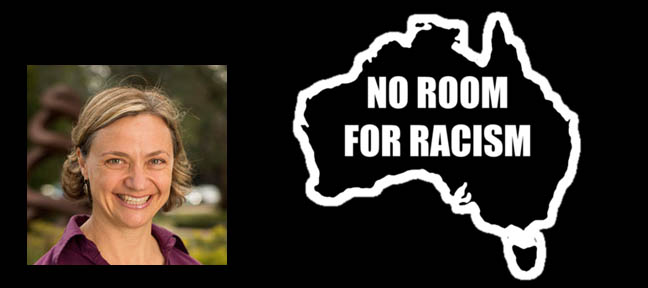
Article in PDF (Download)
Equal freedom for all requires limiting freedom of expression by Dr Emma Larking*
Centre for International Governance and Justice, ANU. Reprinted by special permission of Regarding Rights
The federal Government claims that it has a ‘freedom agenda’. Part of this agenda involves repealing section 18C of the Racial Discrimination Act 1975. This ‘offensive behaviour’ section makes it unlawful to publically offend, insult, humiliate or intimidate people on the basis of their race. The section has been in operation since 1995 and has been restrictively interpreted by the courts: in order to be unlawful the behaviour must have a ‘profound and serious’ impact.
The Government wants to replace section 18C with a new section making it unlawful only to ‘vilify’ or ‘intimidate’ people on the basis of their race. Attorney-General George Brandis says that the changes ‘will strengthen the Act’s protections against racism, while at the same time removing provisions which unreasonably limit freedom of speech.’ A close look at the proposed amendments demonstrates, however, that they do not strengthen protections against racism.
What is the substance of the proposed amendments?
The amendments repeal sections 18B, 18C, 18D and 18E of the Racial Discrimination Act.
Currently, section 18B provides that if an act is done for two or more reasons, any one of which ‘is the race, colour or national or ethnic origin of a person’, then that act is taken to have been done because of the person’s race, colour (etc.).
Section 18C(1) prohibits acts done in public that are:
(a) ‘…reasonably likely, in all the circumstances, to offend, insult, humiliate or intimidate another person or a group of people; and’ are
(b) ‘…done because of the race, colour or national or ethnic origin of the other person or of some or all of the people in the group.’
While unlawful, acts in breach of this section do not constitute a criminal offence – instead, they may be the subject of complaints to the Australian Human Rights Commission.
Section 18D lists exemptions for acts done ‘reasonably and in good faith’ in certain contexts. This means that otherwise offensive acts that are part of artistic performances or academic debates, for example, or are the subject of fair and accurate reporting, are not unlawful.
Section 18E makes employers liable for the acts of their employees or agents that are unlawful under section 18C, unless the employer has taken all reasonable steps to prevent the unlawful behaviour.
The proposed amendments insert a new section in the Act making acts done in public unlawful if they are reasonably likely to vilify or intimidate another person or group of persons and the acts are done because of the race, colour or national or ethnic origin of that person or group of persons. What counts as vilification or intimidation is narrowly defined, with the word ‘vilify’ specified to mean ‘inciting hatred against a person or a group of persons’, and the word ‘intimidate’ to mean ‘cause fear of physical harm’.
The proposed section further specifies that assessing whether an act is reasonably likely to vilify or intimidate involves taking into account ‘the standards of an ordinary reasonable member of the Australian community, not…the standards of any particular group within the Australian community.’
The section also exempts any material ‘communicated in the course of…public discussion’ from being unlawful under the Act.
Given the removal of protection against offensive, insulting, and humiliating behaviour, along with the fact that vilification and intimidation are so narrowly defined in the proposed amendments and the exemption for public discussion is so broad, the changes cannot plausibly be described as strengthening protections against racism.
Reasonable limitations on freedom of expression
While the proposed amendments do not strengthen protections against racism, do they remove limitations on freedom of speech that are unreasonable in a liberal society?
In this year’s Alice Tay Lecture on Law and Human Rights, Federal Race Discrimination Commissioner Dr Tim Soutphommasane considers the meaning of ‘freedom’ in the liberal tradition. He argues that the enjoyment of equal spheres of freedom for all members of society – those who are potentially objects of racism as well as those who may hold racist views – requires placing some modest limits on freedom of expression, such as the limits currently contained in section 18C of the Racial Discrimination Act. This is the case, he says, because racism has a silencing effect on those who are subject to it, making it more difficult for them to freely express themselves and to air their perspectives in public. Testimony from people who encounter racism supports his claim. Given the impacts of racism, the limits on expression contained in section 18C are reasonable in a society committed to securing equal freedom for all.
Ironically, the Government has been unwilling to air the details of a public review of the proposed amendments. While the Attorney-General’s department refused a Freedom of Information request by Fairfax media to view submissions to the inquiry, it was revealed today following a successful FOI request by Simon Rice from ANU’s Faculty of Law that 76% of submissions to the review agree with Dr Soutphommasane and oppose the changes. Despite this opposition, Senator Brandis remains committed to amending the Racial Discrimination Act, although he is now working on ‘a compromise wording for 18C’. It is difficult to see how his determination to amend the Act is consistent either with providing stronger protections against racism or with enhancing freedom for all.
* With thanks to guest editor, Rosemary Grey

